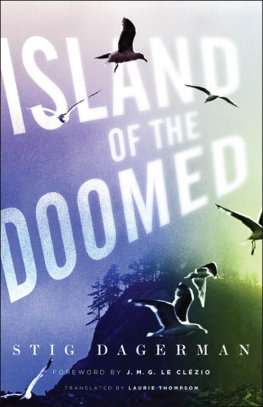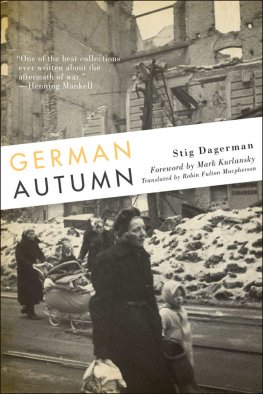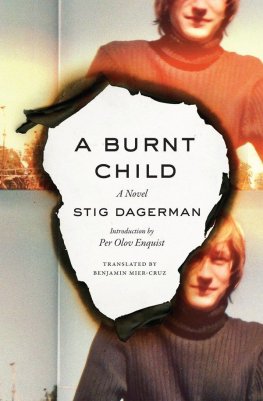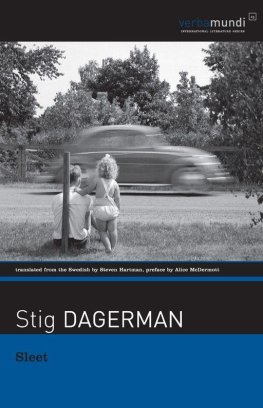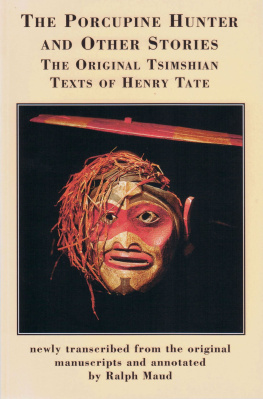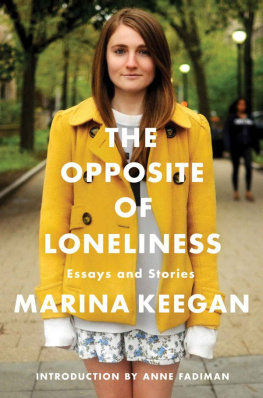STIG DAGERMAN
SLEET
SELECTED STORIES
Translated from the Swedish
by Steven Hartman

This is a Verba Mundi Book
published in 2013 by
D AVID R. G ODINE , Publisher
Post Office Box 450
Jaffrey, New Hampshire 03452
www.godine.com
Originally published in Swedish in 1947 in Noveller I Urval by Norstedts, Sweden. Published in English translation by agreement with Norstedts Agency.
Copyright 1947 by Stig Dagerman
Translation copyright 2013 by Steven Hartman
Preface copyright 2013 by Alice McDermott
All rights reserved.
No part of this book may be used or reproduced in any manner whatsoever without written permission from the publisher, except in the case of brief quotations embedded in critical articles and reviews. For information contact Permissions, David R. Godine, Publisher, Fifteen Court Square, Suite 320, Boston, MA 02108.
This publication was made possible with a translation subsidy from The Swedish Arts Council.
LIBRARY OF CONGRESS CATALOGING-IN-PUBLICATION DATA
Dagerman, Stig, 19231954.
[Short stories. Selections]
Sleet : selected stories / Stig Dagerman ; translated from the Swedish by Steven Hartman. First edition.
pages cm. (Verba Mundi ; 23)
These stories originally appeared in Swedish in 1947 in Noveller I Urval by Norstedts, Sweden.
HARDCOVER ISBN : 978-1-56792-446-6
EBOOK ISBN : 978-1-56792-513-5
I. Hartman, Steven P., 1965 II. Title.
PT 9875. D 12 S 54 2013
839.73'74 DC 23
2012043446
Contents
Preface
I was introduced to the work of Stig Dagerman by his daughter, Lo, nearly twenty-five years ago. At the time we were both mothers of preschool sons, and in the way of mothers overseeing playdates, we had begun to exchange brief biographies as we sat together on Los back deck while our boys played their imaginary games in her yard. I learned that Los father had been a Swedish writer of much renown, a novelist, a short story writer, a poet, and a playwright. He was also a journalist. In 1946, he had been sent on assignment to postwar Germany to record the devastation there, one of the first independent journalists to do so. His second wife, Los mother, Anita Bjrk, was an actress. He committed suicide in 1954, at thirty-one, when Lo was younger than our sons were when we met.
Of course, I asked if her fathers work was available in English. Lo had a British edition of German Autumn, her fathers collected articles about the German people after the fall of the Third Reich; a book of short stories called The Games of Night; and a novel, A Burnt Child. She hoped eventually, she said, to find some time (as working mothers of preschool children, we were well familiar with that how to find the time refrain) to seek out an American translator for her fathers work.
Our four-year-olds were running and calling in the yard. A suburban autumn, as I recall. It so happened, I told her, that among my graduate students that semester there was a very bright and talented young fiction writer named Steven Hartman, who was also fluent in Swedish.
Its inevitable, perhaps, that while reading Steven Hartmans translations of Stig Dagermans stories collected here in Sleet, I find myself recalling something of the substance of those days when Lo and I were young mothers standing watchful on the periphery of our small sons games. Young boys, after all, imaginative young boys, appear often enough in these stories: large-eyed, as one thinks of them, tentative, observant, loving, lonely. And I suppose it could be argued that the various autobiographical settings of the stories, from the small farms and villages Dagerman himself spent his first six years living on his grandparents farm in lvkarleby to the working class flats of Stockholm where he later lived with his father and stepmother have a kind of parallel in the urban/rural convergence that is a secluded backyard in a busy American suburb. But personal experience and its attendant associations seem insufficient to explain the depth of feeling that these stories achieve. For me, there is something at work here that calls to mind much more than the circumstances of my own introduction to Stig Dagermans writing. It is, I think, a tremendous generosity of heart, an overwhelming empathy expressed in tandem with a keen awareness of the inevitable suffering, the loneliness and pain, the pettiness and cruelty, that make up the human experience. There is a compassion to Stig Dagermans clear-eyed vision of the world that causes me to recall as I read these stories not merely the circumstances that brought me to his work, but the less tangible experience of being a young mother watching over a young childs play: that heady mix of caution, joy, pride, fear, helplessness, and love.
I confess that this was not what I expected to find from this tragic Swedish writer when I opened German Autumn, the first of his works that I borrowed from his daughter. I expected darkness. Angst. The void. Hopelessness. But what I found instead was an account of human suffering unbiased by politics or nationalism, hatred or revenge. An account of human suffering given with both a novelists eye (A big bare room with a cement floor and a window that has been almost entirely bricked up. A solitary bulb hangs from the ceiling and shines unmercifully on three air-raid-shelter beds, a stove reeking with sour wood, a small woman with a chalk-white face stirring a pot on the stove, a small boy lying on the bed and staring up apathetically at the light,) and a moral vision that managed to maintain, respect for the individual even when the individual has forfeited our sympathy and compassion the capacity to react in the face of suffering whether that suffering may be deserved or undeserved. Dagerman writes:
People hear voices saying that things were better before [Hitlers defeat], but they isolate these voices from the circumstances in which their owners find themselves and they listen to them in the same way as we listen to voices on the radio. They call this objectivity because they lack the imagination to visualize these circumstances and indeed, on the grounds of moral decency, they would reject such an imagination because it would appeal to an unreasonable degree of sympathy. People analyze: in fact it is a kind of blackmail to analyze the political leanings of the hungry without at the same time analyzing hunger.
An imagination that appeals to an unreasonable degree of sympathy is precisely what makes Dagermans fiction so evocative. Evocative not, as one might expect, of despair, or bleakness, or existential angst, but of compassion, fellow-feeling, even love. The brief story To Kill a Child, as unsparing as it is Because life is constructed in such a merciless fashion, even one minute before a cheerful man kills a child he can still feel entirely at ease ends up being a lament, not a shrug; a lament for all of us at the mercy of merciless time, unwitting victims of lifes circumstances. Dagerman rivals Joyce in his ability to depict the intractable loneliness of childhood, but time and again, in stories like The Surprise, The Games of Night, and the marvelous Sleet, he tempers this loneliness with brief gestures of hope, connectedness: the poem on the phonograph record, the bright coins from his fathers drinking companions, the warm hand of the aunt from America. There are tears in these stories, for sure, cruelties, eruptions of violence, but none of this is offered without pity and even in his stories in which irony reigns Men of Character, Bon Soir Dagerman never turns a cold eye on his creations.
Next page

